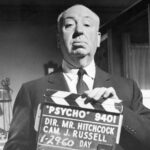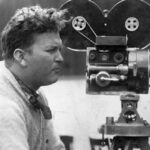Art of Screenwriting
Written by Liseth Correa Hubbard
Narrated by Robert Sibley
Edited by Rachel Taylor
Alfred Hitchcock said, “To make a great film you need three things: the script, the script and the script!”
But why is the script so essential to filmmaking?
The script or screenplay is a detailed guide of the movie from the beginning to its end. In it, the characters’ dialogue, sounds effects, music and actions are described. Although, writing a script is so much more than that, it is the art of taking a dream and putting it down in words to create a connection between possibility and achievement.
Before ‘screen script’, the writing for films was called a scenario, in which there was a description of the scene, sound effects, and indications of the shooting length. But with time, the continuous script took place. An early filmmaker who understood the importance of a screenplay was Thomas Ince, also known as “Father of the Western”.
His studio in California, which provided the stage and set at the same location. Thomas Ince’s model of an organization established the standard for the studios that we know nowadays. He thought it essential to have a script prior to film production. Casa Blanca, The Godfather, and Citizen Kain are classic movies, known for their powerful scripts.
Personally, when I evoke a great screenplay, Forrest Gump comes to my mind. This movie based on the homonym book by Winston Groom and adapted by screenwriter Eric Roth, has a peculiar way of involving the spectator with historical events from Gump’s subjective world. The sense of humor and the moving scenes are well balanced through the storyline.
Writing screenplays
The industry highly bets on successful novels and incredible true stories that warranty a blockbuster. Hence, there are commissioned screenplays built by a hired writer or a team of writers that follow a pattern. But whether it is an original or adapted screenplay, what makes it great?
Hitchcock once stated, “I depend on style more than plot. It is how you do it, and not your content that makes you an artist”. This could be very relative since it is undeniable that there are astonishing stories, but a writer’s style definitely contributes to the ability to engage with the audience.
How many screenwriters spend a huge number of hours developing a screenplay and structuring it, with the hope that one day their creation will make it to the big screen? However, how many of those original works are chosen or even read every year, without mentioning several obstacles that writers face down this adventurous road?
Screenwriting careers now
In 2018, A Star is Born made the audience sigh with its touching story, however, it wasn’t the first time this title reached the big screen. This Bradley Cooper’s film is the third remake of the original 1937 movie, it seems like Hollywood is running out of new stories.
Netflix, Hulu, and different streaming services are giving space to independent filming and writers. Screenwriting is not always a profitable and rewarding job; it seems like the hardest part is to get a foot inside the industry. Several film festivals promote new talents, for instance, the Austin Film Festival in Texas which focuses on the art of storytelling.
There are diverse opinions about screenwriting as a full-time career now, but there is certainty about one thing: there is no film without a script.
Liseth Correa Hubbard is a journalist and writer. She graduated from Universidad Politécnica Salesiana in Quito, Ecuador with a Bachelor’s degree in Social Communication. Liseth is currently working on her Master’s in Communication at University of Texas at Tyler. In 2018, Liseth won the North Texas Book Festival Award with her children’s book Toto El Terramag.
Musings & Movies
Read more articles about films and the industry





